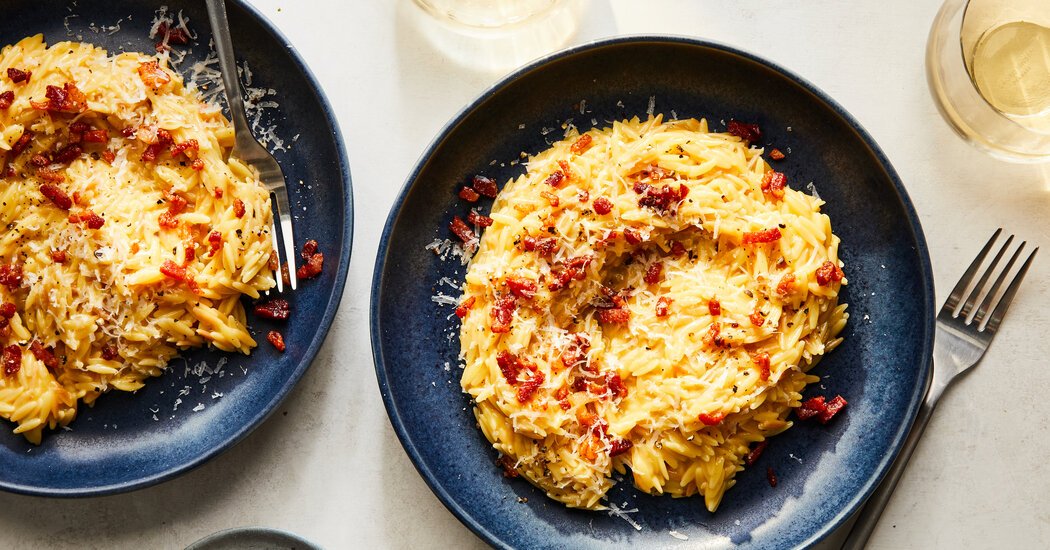[ad_1]
The Italian carbonara police don’t want you to put ham in your spaghetti carbonara; they’ve made that clear. And don’t even think about splashing in cream or grating over Parmesan instead of pecorino.
But would they be so angry if the noodles were another shape — maybe small, ovalish orzo?
Carbonara “is the poster child for everything that’s wrong and right with trends,” said Roberto Serrini, a filmmaker and journalist who has studied carbonara intensely. His main point is that carbonara changes with time.
In the 1960s, it meant a splash of Cognac to pair with the bacon. Today, it means guanciale, eggs, Pecorino Romano and lots of black pepper (the carbon in carbonara).
One thing is clear: Using orzo pasta gets you to a plate of creamy, cheesy carbohydrates in a faster, and more foolproof, way than rice or spaghetti alike.
In Italy, the dish known as orzotto — a portmanteau of the words orzo and risotto — is made with pearl barley, “orzo” in Italian. Outside the country, however, and as it is here, the same word can refer to a risotto-like dish where orzo pasta, what Italians call “risoni” (large rice), is used in place of the rice.
Orzotto is “better than risotto because it’s a little easier to cook,” Mr. Serrini said. “You don’t have to stir it constantly.”
In this recipe, the chicken stock is added all at once, and the orzo needs a mere 7 to 9 minutes to plump over a gentle flame. You can take comfort in knowing that your end result will eat like a risotto in half the time and with much less stirring — and your mouth will be coated with carbonara’s perfect emulsion of cheese, egg and pork fat.
The anchoring succor of a classic carbonara cannot be beat, but it takes some technique to get the texture right. The trick here is to use guanciale, cured pork jowl, if you can find it, not just for its peppery flavor and crispy meat, but for its golden fat, which helps blend the eggs into a smooth sauce.
And the eggs, run through with pecorino and a cascade of freshly ground black pepper, should be first tempered with a ladle of the cooked orzo before folding into the rest of the pot. The extra starchiness of the rice-shaped pasta is yet even more insurance from the worst thing that can happen to your carbonara: scrambled eggs.
This is carbonara for the clumsy, the impatient and the greedy.
For more of a risotto flavor (at the risk of angering purists), you could cook a finely diced shallot, maybe even some celery or celery seed, in the guanciale fat before adding the orzo, then stir in a splash of white wine or Cognac.
This eggy-peppery comfort is best eaten right off the heat. But it is odd how, even straight out of the fridge, cold, it still stays glossy, like a dreamy pasta salad.
The carbonara police might not like that, but you do, right?
[ad_2]
